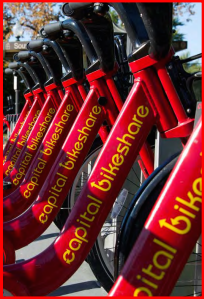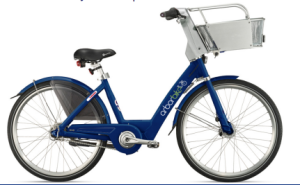With the bankruptcy filing of the Public Bike System Company, more commonly known as Bixi, bike sharing has been getting some stinky press as of late.
Bixi, which is based in Montreal, filed for bankruptcy protection earlier this year after it was unable to make payments to suppliers and several municipalities, including New York, Chicago, and its hometown of Montreal. The implementation of bike share systems in Vancouver and Portland has been delayed because of the Bixi blunder, according to reports.
The future may seem gloomy in light of recent events, but mobility nuts shouldn’t fear: there are still several promising bike share systems that are expected to pop up across the U.S.:
1. Arborbike – Ann Arbor, Mich.
This system is arguably long overdue. Ann Arbor is known for being an environmentally-friendly town, and its large concentration of college students makes it attractive place for a system. The Ann Arbor News reports that The Clean Energy Coalition, a local non-profit, expects to launch 14 stations in June at various locations throughout downtown and near the campus of the University of Michigan. The University has pledged to help fund the program, in addition to support from the city and the Ann Arbor Area Transportation Authority. Hardware for the program supplied by Wisconsin-based B-Cycle.
The CEC is hoping that area businesses will purchase memberships for their employees or patrons, and they’ve also expressed interest in allowing property owners or developers to underwrite stations around town.
2. Grid Bike Share – Phoenix metro area
Expected to launch this year, the Grid Bike Share will supply bikes to the cities of Phoenix, Mesa, and Tempe, Ariz. The system, which is expected to boast 1,000 bikes at 100 locations, will allow users to reserve bikes via a mobile app.
Rather than signing out a bike at a central computer, each Grid Bike has a solar-powered keypad which unlocks the bike from the rack. These bikes are also embedded with GPS chips, according to Phoenix’s Fox 10.
3. Cincy Cycle – Cincinnati, Ohio
The Queen City’s $1.4 million dollar bike share operation is set to launch by early July. WLWT reports that the system will be deployed in 21 stations within the city’s downtown and the Over-the-Rhine Historic District, with additional bikes and stations planned near the University of Cincinnati later this year.
Cincy Cycle — which has already gained support from local foundations — is expected to supplement the city’s existing bus and streetcar systems.
4. Capital Bike Share (expansion) – Gaithersburg, Md.
Municipal officials in Gaithersburg, Md., a suburb of the nation’s capital, have proposed an expansion of the popular Capital Bikeshare system into the city’s limits, according to The Gazette. The proposed-$1.1 million project would install 20 stations throughout the city in two phases.

Capital Bikeshare bikes at a station.
(Courtesy of District Department of Transportation)
The city is exploring grants, public-private partnerships, bond bills, and transportation impact fees as ways to fund theprogram, The Gazette reported. Capital Bikeshare stations already exist in several other D.C. suburbs, including Rockville, Bethesda, and Silver Spring.
Betting on the success of Capital Bike Share might not be a bad idea. While other major systems appear to be struggling, The Washington Post‘s Emily Badger writes that the Alta-managed system has shown strong figures, thanks in part to the way it has been organized. Gaithersburg officials may want to tread forward cautiously, however: Badger notes that it has been increasingly difficult for Arlington County, Va., to to recover the costs of its Capital Bikeshare stations.



